Turkey and Iran have expressed a clear interest in improving their bilateral economic relations, but remain divided over a range of geopolitical and security issues, to which answers remain elusive.

Iranian President Ebrahim Raisi, left, and Turkish President Recep Tayyip Erdogan leave after a joint news conference following their meeting at the Presidential palace in Ankara, Turkey, Wednesday, Jan. 24, 2024. (Mert Gokhan Koc/Dia Images via AP)
Building Bridges: Iranian-Turkish Economic Unity Amidst Security Rifts
Turkey and Iran have expressed a clear interest in improving their bilateral economic relations, but remain divided over a range of geopolitical and security issues, to which answers remain elusive.
Turkey and Iran, two neighbors with a long and storied shared history, require strong relations if they are to collaborate across a wide range of economic areas. At the present, however, common interests have not translated into a shared foreign policy approach. Indeed, Ankara and Tehran have pursued diametrically opposed objectives at times. It is against this backdrop that Iranian President Ebrahim Raisi visited Turkey on January 24. The two leaders reaffirmed their commitment to strengthening their bonds of trust and shared interests and discussed a range of bilateral issues, including security, energy, and trade.
During President Raisi’s visit, the leaders penned ten cooperation documents that promoted economic cooperation and bilateral cooperation. These agreements span energy, free trade zones, culture, media, and communication, as well as in the areas of power and rail transportation. Evidently, there is a strong willingness to strengthen bilateral ties and pave the way for new phases of cooperation. The visit also highlighted the need for both countries to work together to combat terrorism, following the deadliest terror attack in post-revolutionary Iran on January 3, 2024.
Cross-border Cooperation
Improved energy cooperation between Iran and Turkey would prove a boon to Ankara, which needs a variety of energy inputs to maintain its post-pandemic economic recovery. A $200 million agreement has been concluded between the Iranian Grid Management Company and the Turkish Electricity Transmission Company (TEIAS) to operationalize the Khoy-Van grid line, which connects the 400-kilovolt BtB HVDC line between Khoy, Iran, and Van, Turkey. With the potential to expand to European countries, this is Iran’s first cross-border grid link utilizing HVDC technology, and facilitates electricity exchange between Iran and Turkey. The 600-megawatt, 400 kilovolt power line enables the trade of electricity itself, which can catalyze economies on both sides of the border.
These developments are simply the most recent in a long list of important bilateral accords that span the frontier between these neighboring states. Over the past half-decade, Ankara and Tehran have signed a raft of important agreements dealing with a multitude of economic sectors, including commerce in agricultural products, investment in oil and gas reserves, and gas exports. The neighbors have also established “free trade zones” along their border to promote economic growth. These zones, such as one in the city of Khoy, seek to promote yearly business development, ensure greater border area trade, and revitalize the region’s flagging transportation sector, with the goal of injecting capital into the local economy. During a meeting of Turkish and Iranian businesspersons, the head of Iran’s Chamber of Commerce, Mines, Industry, and Agriculture (ICCIMA), Samad Hassanzadeh, urged greater collaboration between the Turkish and Iranian private sectors, in the hope that the two countries may realize a bilateral trade target of $30 billion—a goal that such zones bring within reach.
The Islamabad-Tehran-Istanbul Road Transport Corridor, which commenced operations in 2021, serves as another example of efforts to boost cross-border trade. Under the auspices of the Economic Cooperation Organization, Turkey’s Commerce Ministry and its equivalents in Iran and Pakistan established this trilateral initiative with the goal of strengthening ties and facilitating commerce and transportation. A transportation agreement was also struck by Qatar, Iran, and Turkey, with Iran acting as the nation of transit between Qatar and Turkey. These partnerships are a part of larger initiatives to increase commerce and streamline the supply of commodities between the nations. The gas pipeline between Turkey and Iran and joint road transportation initiatives are important factors in bolstering Iran-Turkey energy and economic relations.
Security Issues Remain
Economic relations between Iran and Turkey are constantly complicated by the region’s complicated security dynamics, which have an impact on both regional and economic collaboration. Iran’s gas exports to Turkey have struggled over the past decade, including widespread disruptions and a significant decline in 2023 following shortages in the Islamic Republic. The two nations’ 25-year export contract expires in 2026, raising concerns that the agreement may not be extended amid pricing and sanctions concerns. Turkey’s exploration of alternative suppliers—notably gas-rich Azerbaijan, with whom Iran has a rocky relationship—adds even greater uncertainty to future imports. The future depends on negotiations, geopolitics, and the evolving regional energy landscape. The Middle East’s shifting geopolitical landscape, the transformation of worldwide energy patterns, and the possibility of heightened global economic rivalry may all impact future commercial ties between Iran and Turkey.
Even after President Raisi’s otherwise successful visit, a number of bilateral foreign policy issues remain outstanding: chief among these is the two countries’ differing attitude toward the Workers’ Party of Kurdistan (PKK), which Ankara regards as a terrorist group but Tehran has sometimes sought to accommodate. The security situation in Iraq is also a mutual concern, and is further complicated by Tehran’s connections to Sulaymaniyah and its limited cooperation with Ankara on PKK matters. This complexity was further increased in recent years by the PKK’s redeployment to the Iranian side of Qandil Mountain. Furthermore, Turkey is threatened in Iraq by parts of the Iran-allied Popular Mobilization Forces.
The security of Turkey’s safe zones in Syria is further jeopardized by Iran’s collaboration with the Kurdish YPG and, in turn, the YPG’s coordinated attacks on Turkish forces and the Syrian rebel groups in Idlib. The rise of Shiite militias across Iraq and Syria have contributed to demographic shifts across Turkey’s southern near-abroad. Indeed, Iran has capitalized on Russian retrenchment in this theater, as foreign troops have been withdrawn and deployed in Ukraine. Strategic flexibility from both sides will be needed to address common security issues and clear the path for greater economic cooperation.
That both sides continue to jostle for influence in the Caucasus does little to assuage geopolitical concerns. Turkey and Iran have adopted divergent policies toward Armenia and Azerbaijan, further stoking antagonism in Karabakh. The creation of the Zangezur corridor, which would link Azerbaijan to its western exclave through a route along the Iranian border, may cause significant anxiety in Tehran. For its part, Iran has worsened regional instability by collaborating with Russia to accelerate its nuclear program—a policy that has implications not just for the South Caucasus, but the whole Middle East. Turkey strongly opposes a nuclear-armed Iran, viewing Iranian nuclear brinkmanship as a potential flashpoint for regional escalation or an arms race; while Turkey has never demonstrated interest in developing a nuclear capability of its own, a nuclear-armed Iran could do much to change this calculus.
The recent accords agreed to by Presidents Raisi and Erdogan stand to benefit both countries immensely. However, sanctions and geopolitical unpredictability remain serious obstacles to the successful implementation of these agreements, which would bring about improved energy security and bilateral trade. In particular, the Khoy-Van grid link has the potential to transform cross-border electricity transfers entirely, marking a new era for Iran-Turkey cooperation.
Though the agreements are an encouraging first step, they of course come with potential drawbacks. Hyperinflation in both countries threatens to spill over into a full-on financial crisis, and the existing international sanctions regime renders it difficult for Turkey to engage with the Iranian market. Maintaining good ties still requires skillfully handling disagreements resulting from regional problems, such those involving Syria, Iraq, and the Israeli-Palestinian conflict. To achieve leaders’ stated goal of $30 billion in annual trade, both sides must resolve major regional security issues with great care. Only then may the two states reach the lofty goals set during the January 24 state visit.
The views and opinions expressed in this article are those of the authors and do not necessarily reflect the views of Gulf International Forum.





